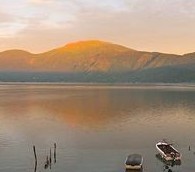Destination: Honduras
Listen to This: Aurelio Martinez and ‘Mayahuaba’
by Jim Benning | 06.28.11 | 10:49 AM ET
Aurelio is a Honduran musician and member of the Garifuna community. This song is from his new album, Laru Beya. It makes me happy.
Cross-posted from JimBenning.Net.
World Travel Watch: G20 Alert in Seoul, Volcano in Indonesia and More
by Larry Habegger | 11.03.10 | 3:14 PM ET
Larry Habegger rounds up global travel news
Lightning Flashes in El Salvador
by Tracy L. Barnett | 10.27.10 | 10:02 AM ET
Tracy L. Barnett stepped off a bus, checked into a luxury resort and learned something about the indifferent forces of nature
Square Grouper on the Cocaine Coast
by Jill K. Robinson | 07.28.10 | 10:09 AM ET
When Jill K. Robinson found her perfect beachfront property off Honduras, she didn't realize she'd just bought into a slice of the drug trade
World Travel Watch: Striptease at Uluru, Ongoing Strikes in Greece and More
by Larry Habegger | 06.30.10 | 12:11 PM ET
Larry Habegger rounds up global travel news
World Travel Watch: Havoc in Central America, Volcano Fears in Iceland and More
by Larry Habegger | 06.02.10 | 12:55 PM ET
Larry Habegger rounds up global travel news
World Travel Watch: Chaos in Kyrgyzstan, Protests in Thailand and More
by Larry Habegger | 04.14.10 | 12:14 PM ET
Larry Habegger rounds up global travel news
World Travel Watch: Dengue in Nicaragua, Instability in Bosnia and More
by Larry Habegger | 10.23.09 | 12:11 PM ET
Larry Habegger rounds up global travel news
The Heat Seeker: ‘Between Unseemly and a Little Slutty’
by Alison Stein Wellner | 05.14.09 | 10:48 AM ET
Alison Stein Wellner likes her food hot and spicy. To find out how hot and spicy, she searched the world for heat. Part four of five: What happened in Honduras.
Video: Alison Stein Wellner: The Heat Seeker
by World Hum | 05.11.09 | 11:16 AM ET
Alison Stein Wellner traveled around the world to eat the hottest food she could handle, a quest she chronicled for World Hum
Given the Dire Economy, Should I Travel Overseas This Year?
by Rolf Potts | 04.20.09 | 10:12 AM ET
Vagabonding traveler Rolf Potts answers your questions about travel and the world
Should My Black Friend and I Worry About Race While Traveling Overseas?
by Rolf Potts | 03.30.09 | 10:14 AM ET
Vagabonding traveler Rolf Potts answers your questions about travel and the world
Exploring Eco-Tourism in the Original Banana Republic
by Jim Benning | 06.05.08 | 2:25 PM ET
Honduras, we learn in Elisabeth Eaves’s fourth Slate dispatch this week, is where short-story writer O. Henry had been exiled to in the 1890s when he coined the phrase “banana republic.” Her fine series of stories, beginning with Monday’s installment, looks at whether the country is benefiting from the rise of eco-tourism. Tomorrow’s piece, she tells us, will touch on Mel Gibson and the ancient Mayans. Eaves reviewed “The Darjeeling Limited” for us last fall.
Photo by Lauri Vain via Flickr, (Creative Commons).
Soccer: Three Great Books
by World Hum | 06.12.06 | 1:16 PM ET
Soccer is more than just another sport. It often reflects centuries-old ethnic, nationalist and religious tensions. It’s a global business. Its fans are wildly—and sometimes violently—passionate about their teams.
While some writers have explored the subject as part of larger works—Ryszard Kapuscinski’s The Soccer War features (despite what its title might suggest) just one compelling chapter on the soccer-inspired war between El Salvador and Honduras, for example, and Paul Theroux’s “The Old Patagonian Express” includes a terrific passage about a soccer-related riot in San Salvador—other writers have devoted entire books to soccer and the culture that surrounds it.
Herewith, three great books about soccer:
How Soccer Explains the World: An Unlikely Theory of Globalization by Franklin Foer. Foer travels the globe, hanging out with soccer hooligans and exploring age-old rivalries to see how soccer reflects—or doesn’t—the forces of globalization at work. His insights are fascinating. For example, he traces the relationship between the Balkan Wars and soccer: how, early on, soccer fans at Red Star Belgrade stadium had chanted for secession from Yugoslavia; how Slobodan Milosevic’s interior minister had sat on the soccer team’s board; how Serb leaders recruited nationalist Red Star fans for paramilitary operations. And that’s just the opening chapter. In the prologue, Foer addresses larger questions about the world’s future, noting that many have embraced traditionalism out of fear that globalization will obliterate indigenous cultures. But soccer, he finds, suggests the future is not so simple. Local allegiances and identities continue to thrive.
He writes:
By the logic of both its critics and proponents, the global culture should have wiped away these local institutions. Indeed, traveling the world, it’s hard not to be awed by the power of mega-brands like the clubs Manchester United and Real Madrid, backed by Nike and Adidas, who have cultivated support across continents, prying fans away from their old allegiances. But that homogenization turned out to be more of an exception than I had anticipated. Wandering among lunatic fans, gangster owners, and crazed Bulgarian strikers, I kept noticing the ways that globalization had failed to diminish the game’s local cultures, local blood feuds, and even local corruption. In fact, I began to suspect that globalization had actually increased the power of these local entities—and not always in such a good way.
Fever Pitch by Nick Hornby. In his 1992 bestseller, Hornby explores the world’s fascination with soccer through his own obsessive relationship with Premiership powerhouse Arsenal. “While the details here are unique to me,” he writes in the introduction, “I hope they will strike a chord with anyone who has ever found themselves drifting off, in the middle of a working day or a film or a conversation, towards a left-foot volley into a top right-hand corner ten or fifteen or twenty-five years ago.” The great strength of “Fever” lies in Hornby’s recall of those details—the book is organized in short sections that take place at or are inspired by his memories of matches—right down to the noise in the stadium the first time he took his place in the jam-packed North Bank with Arsenal’s most passionate fans.
I loved the different categories of noise: the formal, ritual noise when the players emerged (each player’s name called in turn, starting with the favourite, until he responded with a wave); the spontaneous shapeless roar when something exciting was happening on the pitch; the renewed vigour of the chanting after a goal or a sustained period of attacking ... After my initial alarm I grew to love the movement, the way I was thrown towards the pitch and sucked back again. And I loved the anonymity: I was not, after all, going to be found out. I stayed for the next seventeen seasons.
The Miracle of Castel di Sangro: A Tale of Passion and Folly in the Heart of Italy by Joe McGinniss. On one level, “The Miracle” is a book about soccer—the highs and lows, the dreams and despair that a team from Castel di Sangro in southern Italy faced throughout its hardest year ever. They lacked skill, talent, organization and money, but played from the bottom of their souls. On another level, “The Miracle of Castel di Sangro” is about people—the players, their families and their fans (for many of whom this would be the most exciting year since World War II). It is a book about a nuanced Italy, complete with its bumps, warts and graceful curves; the paradoxical land, as one player remarked, of both Dante and Machiavelli, where there is always more beneath the surface. McGinniss is a master of his craft. His sketches of life in Castel di Sangro are so smooth and so vivid that you can easily find yourself lying awake at night worrying about the next day’s game.
—Jim Benning, Michael Yessis and Frank Bures contributed to this report.
Henry Rollins Hits the RoadóWith the U.S.O.
by Michael Yessis | 11.16.05 | 5:08 AM ET
How did anti-war punk-rock legend Henry Rollins end up on tour with the U.S.O., supporting United States military troops in hot spots around the world like a latter-day Betty Grable? “[T]here are reasons beyond sheer love of country that influence a performer’s decision to tour with the U.S.O.,” Susan Dominus writes in Sunday’s New York Times Magazine. “For Rollins, the travel provides creative fodder, but it also gives him access to places he wouldn’t ordinarily visit, among them Iraq, Afghanistan, Kyrgyzstan, Qatar and Honduras.”
- « Prev Page
- Next Page »






